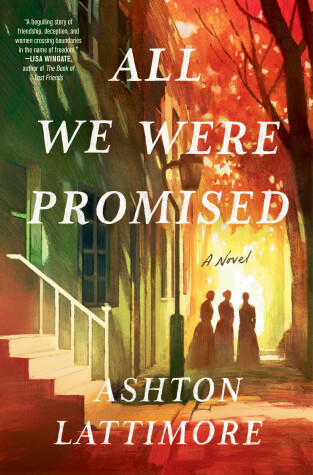All We Were Promised storylines (there are three) are centered around three individuals: Carrie/Charlotte (the escaped slave), Nell (an upper-class free woman of color), and Evie (a slave and Charlotte’s friend). The storyline was well-written and compelling. I was immersed in all three women’s plights and was an anxious mess during the last half of the book. I will warn you all that this book does not hold back when it comes to the treatment of black people (both slaves and free) pre-Civil War.
The storyline that centered on Carrie/Charlotte was sad. Charlotte and her father, James, escaped from slavery four years before the book started. James, or Jack as he was known to his former owners and Evie, could pass as a white man. He took advantage of that and built a thriving woodworking business. But, for Charlotte, it was torture. She was kept on a short leash and couldn’t interact with anyone but her father and the cook (who was a free man of color). It drove her up the wall and was why she started going to Nell’s reading club and sharing her abolitionist views. Charlotte was sympathetic, but I felt she took some unneeded risks. Like not telling Nell the whole truth about herself and how she knew Evie. Or risking her freedom to attend speeches by famous abolitionists. She also blamed her father for everything that went wrong, which also factored into her behavior.
The storyline that centered on Nell was interesting. She was a free woman of color who was also upper-class and whose family held considerable power in Philadelphia. Nell did come across as a pampered, spoiled woman sometimes, but you could tell her heart was in the right place. Meeting Charlotte and getting involved with her quest to free Evie opened her eyes. I did have some unanswered questions about her (mainly about the engagement and whether she learned anything from what happened to her).
The storyline that centered on Evie caught my heart and my attention. Evie was the personal slave of Missus Kate, and what she endured was awful. His mother and brother were both sold, leaving her alone on the plantation with Kate and a handful of slaves. I couldn’t get past the cruelty that was so casual or Kate’s lack of empathy. My draw dropped when Kate told Evie her plans for her after Kate’s marriage and where she was going (the brother’s manor for reeducation). I was caught up in this storyline and was rooting for Evie to leave.
This book takes place thirty years before the start of the Civil War. Every event mentioned in the book is accurate, and the author explains everything in a beautifully worded afterword.
Philadelphia did not live up to its City of Brotherly Love motto during this time. There was racial tension and rioting that seemed to be almost every day. It was a stressful time to live in.
The end of All We Were Promised was a little bittersweet. The author did not cement the futures of the three girls. I want to think that Evie and Charlotte could live freely and happily. I’d also like to believe that Nell kept to her values and what she wanted to do (be active in the abolitionist movement and not marry).
Many thanks to Random House Publishing Group – Ballantine, Ballantine Books, NetGalley, and Ashton Lattimore for allowing me to read and review this ARC of All We Were Promised. All opinions stated in this review are mine.
